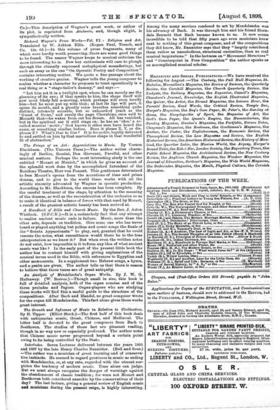Richard Wagner's Prose Works — Vol. VI.: Religion and Art. Translated by
W. Ashton Ellis. (Kegan Paul, Trench, and Co. 12s. 6d.)—In this volume of prose fragments, many of which were hardly worth preserving, there are some good things to be found. The nearer Wagner keeps to musical criticism the more interesting he is. Few but enthusiasts will care to plough through the clumsily expressed metaphysical meanderings, but such an essay as the one "On Operatic Poetry and Composition" contains interesting matter. We quote a fine passage about the working of creative genius. Wagner tells the young composer to realise whether a character he proposes to treat operatically is a real thing or a "stage-tailor's dummy," and says :— "Let him set it in a twilight spot, where he can merely see the gleaming of its eye ; if that speaks to him, the shape itself will now most likely fall a-moving, which perhaps will even terrify him—but he must put up with that; at last its lips will part, it opens its mouth, and a ghostly voice breathes something quite distinct, intensely seizable, but so unheard-of (such as the 'Guest of Stone,' and surely the page Cherubino, once said to Mozart) that—he wakes from out his dream. All has vanished, but in the spiritual ear it still rings on : he has an 'idea,' a so- called musical motiv ; ' God knows it other men have heard the same, or something similar, before. Does it please X, Y, or dis- please Z ? What's that to him ? It is his motiv, legally delivered to and settled on him by that marvellous shape in that wonderful at of abstraction."


































 Previous page
Previous page